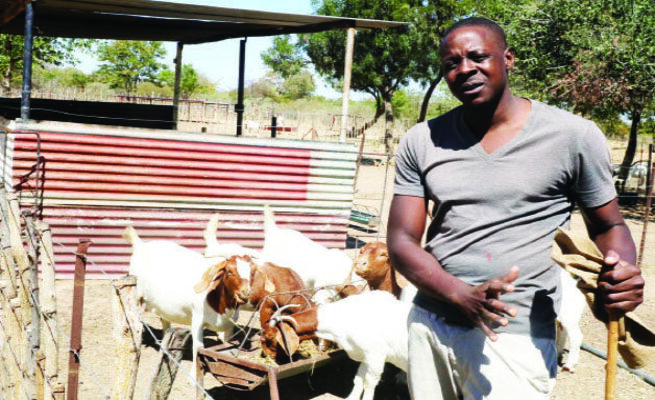A PIECE of advice that young pedigree Boer goat breeder, Mr Peter Mukombe, always gives aspiring young farmers is to always start small with the little they have and grow big from there.
His transformative goat farming journey testifies to this after he left the comfort in the United Kingdom and returned home to start a new life.
Today, Mr Mukombe is one of the proudest, leading Boer goat breeders in the southern region. His pure breed ram, a male breeding goat, can cost as much as US$1 000 while the females can go as high as US$350.
Recently, it took Mr Mukombe a simple post in a farmers’ social media group that he was selling a Boer goat ram and after 30 minutes a buyer from Gokwe had made contact and the animal was off the market.
Mr Mukombe runs a successful Boer goat breeding venture in a plot at Mfazimithi area, Umguza District, and as of yesterday when the Chronicle caught up with him at his farm he had over 150 Boer goats.
He explained how he left his job as a psychiatric nurse in the United Kingdom to start farming from scratch.
Mr Mukombe acquired an idle plot after it was repossessed from the previous owner who failed to make meaningful use of the land, prompting authorities to take it back and offer it to someone who could contribute to the Government’s vision of boosting national food security.
“People always ask how we started and my response is that we kicked off this project with absolutely nothing, that’s about 15 years ago but started with Matabele goats, which are not a pure breed but are disease resistant,” he said.
“The problem with most of our communal farmers is that they don’t run their projects as commercial enterprises.
By profession, I’m a psychiatric nurse and I’ve lived overseas for years but the idea of working for somebody else didn’t sit well with me and my family was very supportive when I told them that I wanted to come back home permanently.
“We started with a few goats, the local indigenous breeds and encountered a lot of challenges along the way but we kept pushing for about three years until we ventured into Boer goat breeding because I wanted to set myself apart from the rest of the farmers in the area.
“I bought 10 Boer goats from South Africa and using the same lessons I had learnt with the Matabele goats, the project started growing to where it is now,” explained Mr Mukombe.
Last week, he exhibited at the Bulawayo Agricultural Show, which runs concurrently with the Zimbabwe International Trade Fair where one of his Boer rams won a prize.
The knowledge that he gains from the personal experiences, trials and tribulations of other farmers drive him to better himself. Mr Mukombe says he has been asked a few times why he would spend US$75 on semen of a superior Boer goat breed from South Africa.
“Breeding is a never ending process, the reason why I still, to date, travel to South Africa to buy semen from other superior breeds is because I always want to improve my herd,” he said.
“My Boer goat breeds might have a big body frame but lack the amount of meat I want from my pedigree goats so I look for a farmer whose Boer goat rams can improve my breeds.
“From about 30 females, I select six for artificial insemination with the semen bought from other breeds like the semen straws I got from South Africa, which cost no less than R1 500,” he said.
Mr Mukombe’s farm is self-sustainable as he strives to feed his animals from the stock feed that he grows.
Like a food-secure nation that feeds its people from reserves accumulated over a number of successive harvests, Mr Mukombe does not buy stock feed but produces it at the plot.
On a piece of land about three quarters of a hectare, he has planted maize, sorghum and sunflower, which he would turn into silage so that his goats are food secure for another two years even in the middle of a prolonged drought.
Currently, he has silage reserves of about 50 tonnes that will feed his goats until the end of the year.
“We spent about US$500 to plant the maize, sorghum and sunflower and I’m talking about the costs of inputs and we will spend another US$500 to harvest the crops and make silage,” he said.
“The costs of producing silage here at the farm will be far less than buying stock feed that will feed 150 goats for a year or so.
“Our silage is basically maize mixed with sorghum, compacted in a pit and preserved with rich nutrients, which we then add a bit of sunflower to give the Boer goats a balanced diet.
“The crops that we grew will give us another 50 tonnes of silage, thus saving us a substantial amount of money in stock feed,” he added.
A word of advice for aspiring young farmers by Mr Mukombe is to start by securing stock feed for Boer goats before even buying the animals.
“If I was to start this again, I would go for my food security first. It doesn’t have to be a huge piece of land to grow crops for silage, just a small field and then buy the goats,” he said.
“Without adequate stock feed, running a Boer goat business can be challenging, especially given that most young people do not have the financial capacity to buy tonnes of stock feed every month.














